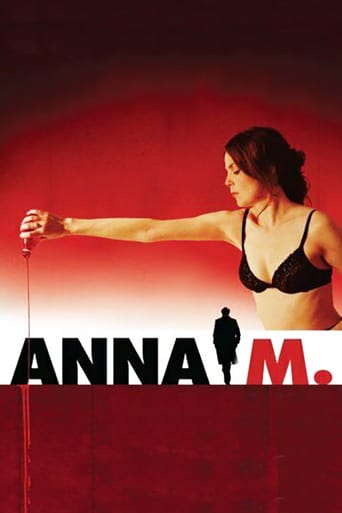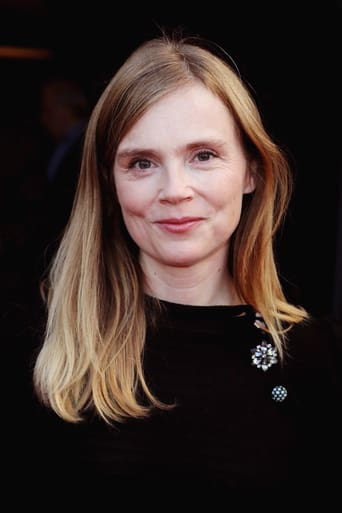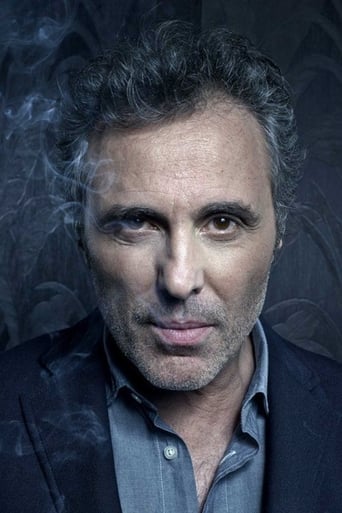

Anna M. (2007)
Anna, a somewhat introverted woman, becomes obsessed with the orthopedic surgeon who helped with her recuperation following a car accident. Incorrectly believing the love to be reciprocated, she embarks on several attempts to try and stay in touch with him but, after several rejections, finds herself descending into despair and, ultimately, hatred.
Watch Trailer
Cast


Reviews
Load of rubbish!!
hyped garbage
It's complicated... I really like the directing, acting and writing but, there are issues with the way it's shot that I just can't deny. As much as I love the storytelling and the fantastic performance but, there are also certain scenes that didn't need to exist.
Let me be very fair here, this is not the best movie in my opinion. But, this movie is fun, it has purpose and is very enjoyable to watch.
Anna M. begins with the titular lead staying on after-hours in a large, expansive, highly decorated library complete with numerous tiers and various places of study for what-not; all the while deeply immersed in her work. She's laying studious claim to her studies so much so, that the entire building appears to just shut down around her; the general ground floor area long since evacuated as afternoon turns into evening which turns into night which causes the building's lights to go out and render the whole area a crepuscular dead zone of objects brought to life no longer by the rays of light which before, gave an odd bronze glow to surroundings. The young woman is still buried into her precise, meticulous, detailed studying, something which the film goes to some lengths to highlight as this calculated, careful and exact person is put across as such. The library is actually the zone in which she works, her skills or overly enthusiastic attitude to her work and the characteristics seemingly required for it coming to leave said place of business before going on to substantially contribute to the morphing of a number of lives outside of it, more often than not for the worse.Isabelle Carré, here coming to eventually look a little like Julianne Moore with a head-cold as things deepen and worsen, plays Anna: a softly spoken but desperately troubled French woman; a loose canon of mental illness and ill-thought; flitting, desperately, from place to place and from unbalanced instance to instance – all the while destroying or self destroying. She lives at home with her mother and their pet dog, the lack of a father figure or some kind of male orientated presence at the home, if it's true, an element no doubt experts within particular fields would be able to highlight most certainly contributes to the sort of behaviour and attitudes, certainly more broadly linked to that of men, that she has. The mother appears somewhat tepid, even passive at being able to do anything about anything; on another occasion, Anna, in a clean and remorseless blow, comes into contact with the pet dog off in a mechanical and somewhat insensitive manner when her desire to rest takes precedence. Writer/director Michel Spinosa barely holds back, the set of characteristics and general frustration within our Anna certainly on show.Something is definitely wrong with Anna, whose first act is to step out in front of a moving taxi in a bid for it to run her down upon leaving her place of work after the opening sequences. This brings her closer to a local doctor named André Zanevsky (Melki), the man whom treats her at the hospital after the failed suicide attempt, but whose very treating of her and presence will kick things off into territory just as harrowing. As an initial coming-together, Dr. Zanevsky must intimately feel and explore certain parts of the body that may have been damaged during the contact with the automobile and consequent fall; the man, perhaps the first to have spoken to Anna in months or even years, is immediately the object of her affection and it does not take long for the girl to be smitten. Throughout, the film delicately balances precisely where it is Anna lies in terms of her own mindset; the ambiguity as to whether she is genuinely insane by way of her talk of hallucinations and the apparent fabrications of memories involving other people goes hand in hand with this morbid level of intelligence she carries around with her, something which furthermore allows the film to present her as this conniving, devilishly clever stalker whose methods of thinking and ways of getting closer to her beau tempts us into thinking she's anything but a mindless, thoughtless idiot doing what she does.The film is a fascinating, and unnaturally engaging piece in its own right; a game of cat and mouse between an already married man whose objectification within the mind of one, disturbed woman whom was the natural victim of procedure following on from her own ill-advised actions, is the core. The film's addressing of sexual frustration, and the systematic dismissing of it as a drive for its protagonist, lies within Anna's ability to flirt and successfully pull a metro worker for a one night stand which does not quench the need to continue to chase Zanevsky. An attractive enough girl, Anna's issues and the film's attitude in regards to wanting to explore something a little more than a bored young woman out to cause a nuisance for herself and others around her, is highlighted to be running deeper here.The film appears to be one of which was constructed by a man with a grim view of women; not a sexist one, but a view of which is most probably scared or a little weary. Furthermore, Anna's ultimate happiness arriving in the form of what it is doesn't necessarily suggest a stance from a filmmaker highlighting that it is the only way women can be happy; more-over, there are numerous other women in the film whom aren't granted the solution Anna is and appear perfectly functional as is in their respective lives. It would be true to say that most of what unfolds in the film might unfold in mostly any order one would deem fit, it is the manner in which such a tale of such a woman and her antics are told in the escalating fashion which they are which keeps it perennially fascinating. Studious, rather agonising and nary afraid to take on a true-to-life mental illness in the harshest, and often bleakest, of forms as numerous people around that of the sufferer are affected for the worse, Anna M. is a stark and rather oddly fascinating little drama which takes a dart and hits the mark.
Overall, I was very impressed with this film, and will certainly delve deeper into this new (to me) area as a result.However, as expressed by earlier reviewers, the scenario wherein a respected doctor is unable to record a complaint, or at least register an early warning, against a woman with a previous history of mental illness does not ring true.Most of all, I was fascinated by the parallels drawn with religion as the film drew to a close. The devotion, unwanted, of this woman to her chosen deity vs. the devotion, demanded, to God(s). I am personally an (ex Catholic) atheist, but recognise so many of us must worship.Please do not let any of my comments detract you from your enjoyment of this truly excellent film.
I'll have to admit that French movies have come a long way since the 60s and 70s, a period during which vastly overrated - but occasionally barely competent - filmmakers such as Godard, Bunuel, and Rohmer bombarded the viewers with plot-less, overly political, and usually pretentious easy-to-make, pointless, free-for-subjective-interpretation, fill-in-the-meaning-yourself baloney. France is still the source of many dumb films (but, hey, so is Hollywood), yet the direction has become far more skillful, and French editors have finally left the unemployment lines and started being hired to do their (underrated) jobs. Many of the older French flicks look as if ALL the scenes that were shot were stuck into the end-product...ANNA M isn't exactly the first movie to deal either with insanity or stalkers, but it's one of the better ones. This is due in large part to Isabelle Carre's charisma and her ability to pull off an ideal, gradual schizophrenic jump from the likable, naive young spinster to the malicious, tunnel-vision-obsessed loon.The only significant drawbacks can be found around the middle, when the movie drifts slightly into far-fetched territory: the whole nonsense about no-one in the police believing the doctor went into overkill drive for a short while there...The ending is somewhat problematic. The birth of her child "cures" her, calms her down: I don't buy that.
I did not particularly appreciate Michel Spinosa's former movie "La Parenthèse enchantée". As a result I was not particularly keen on seeing his next. But I happened to see the trailer for "Anna M." and I was hooked. I HAD TO rush to a theater: thrills seemed to be guaranteed.And I was not let down. With this film Spinosa proves he has made tremendous progress (to my mind at least). His hand as a director has become firmer and the subject he has picked this time around is both an exciting and accurate depiction of a psychiatric clinical case, erotomania as it happens. He has also chosen Isabelle Carré, the ideal actress for the role.The whole plot revolves around an attractive young woman named Anna M. (is "M." a reference to Fritz Lang's accursed "hero"?) who suffers from solitude and depression. After failing to kill herself she is brought back to life thanks to the care of Doctor André Zanevsky. She soon falls in love with him, totally disregarding the fact that the man she shamelessly calls André is happily married and remains totally unresponsive to her advances.Unknown to the doctor and even to herself, Anna suffers from erotomania and having become fixated on him she cannot be reasoned with any more.Her behavior -now laughable now extremely dangerous- is very well documented and described. Open your medical dictionary and you will realize that all that is shown on the screen corresponds to what is written in the book, notably the evolution of the disease in four stages: illumination, hope, spite and hatred. Likewise, the interview led by the psychiatrist before Anna is discharged from mental hospital rings true. Just like in real life the therapist tries to find out through a series of questions whether the patient can be regarded as cured or if she is faking. And does it with such empathy, such humanity you would never say the scene is being played by ... an actor!Of course "Anna M" is not in the least a medical documentary for all that.. The story comes first and the writer/director masters it to perfection. After a half-toned beginning tension soon rises and uneasiness sets in never to release its grip until the end, except maybe during the appeased (although ambiguous) final sequence. The climactic scenes (the attempted murder in the subway, Anna with the two little girls, Anna's relapse) are all duly impressive and call to mind prestigious names like those of Hitchcock ("Psycho" and Roman Polanski ("Repulsion"), among others.Isabelle Carré must be praised for her interpretation, for she is the backbone of the whole effort. Had she not lived up to the spectators'expectations the film would have been a terrible flop even if it had been good in all the other departments. But there was nothing much to fear from such a talented young woman, who is so committed to her art and who has already proved how varied her abilities are ("Les sentiments", "Se souvenir des belles choses", "Holy Lola","Quatre étoiles"). Wholly immersed in her character she is every inch the troubled heroine, in turns sweet, fragile, mean and wild. I now look forward to seeing Michel Spinosa's next. Will I be disappointed? Time will tell.




